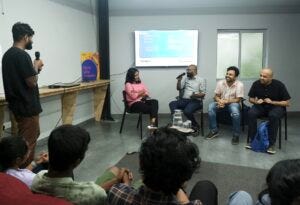The Cookie Jar, June 2023
Meta’s fireballs boomerang; No win for citizens’ privacy in India yet; OpenAI starts fire and cries wolf; Digital India Act shaping alongside Digital Public Infrastructure… and more.
News Chips
Fireball Boomerang
Meta’s reckless fireballs are coming home to roost. After a recent Wall Street Journal exposé, Meta has acknowledged that they overlooked reports of Instagram algorithms ‘enabling’ illicit underage sexual content being fed directly to paedophiles. This, while the company is being fined $1.2 billion – the largest fine imposed under the GDPR – for not complying with the EU’s regulations, and transferring huge amounts of personal data of European users, sans protection from US surveillance.
Not to be left behind, Amazon’s Ring doorbell camera unit that spied on female customers with cameras in their bedrooms and bathrooms, had the Federal Trade Commission land a $30.8 million fine at the company’s doorstep.
CoWin’s No Win Situation
While foreign governments double-down on regulation and establish that users’ data privacy is non-negotiable, India – in the absence of a data protection bill – saw another breach of sensitive personal data. This time, as reported by The Fourth News, the personal data of everyone and their families registered on the CoWin app was being revealed by a Telegram bot, raising questions of safety of citizens’ sensitive personally identifiable information and biometric data. Despite citizens’ personal data as recent as 2022 being supplied, the IT ministry has denied the breach and said that it is ‘old data’. For citizens caught in the web of exploitative businesses and government negligence, it appears to be a No-win situation.
Blitz Chess
With some governments coming down hard with regulations, tech companies are playing hard to get. Google earlier threatened to pull its search engine from Australia, Whatsapp in the UK, Meta in Europe and Microsoft in parts of the United States – but none of these threats have materialised.
Sam Altman, CEO of OpenAI threatened to cease operations in the EU noting the laws on Generative AI were too restrictive, even as they lobbied to water down EU regulations to suit their needs. And finally picked London to open their first international office, all in this one month!
Altman also had a fairly public exchange with Tech Mahindra CEO CP Gurnani on his Indian visit, after supposedly suggesting that the Indian AI ecosystem will be unable to compete with their American counterparts, though Altman insists this was taken out of context. Gurnani’s response ‘challenge accepted’ alludes to a larger Indian self-belief of flexing its digital muscle on a global scale.
My House, My Rules
Governments are scrambling to catch up as AI advancements are leaving regulations and legislation far behind. The US, rather surprisingly, still does not have a concrete legislation on AI, and if some Congressmen are to be believed, is not likely to get one anytime soon. Meanwhile, the G7 members have created an intergovernmental forum – ‘Hiroshima AI process’ – to debate issues surrounding Generative AI, and plan to have suggestions for heads of state by the end of the year. Regional developments are also fast shaping up. Leading the way is the EU, having passed a draft law on AI, the first of its kind, to regulate the use of AI within the bloc, severely restricting facial recognition tools, and asking companies who create generative AI for more information on the data used.
Meanwhile, the key premise of PM Modi’s recent US visit was how India’s innovation leapfrogging positions it as a strategic partner for the US in artificial intelligence, semiconductors and space tech. The PM reassured journalists in the US of India’s democratic values and intentions to make government benefits accessible to all without discrimination.
A Lot To Catch Up With
The proposed new Digital India Act is highly anticipated, despite its paternalistic approach, as existing laws have become redundant and not fit for purpose. India desperately needs new legislation surrounding digital rights and data privacy, especially considering the government’s pursuit of a Digital Public Infrastructure (DPI), unifying citizens’ identity with interoperable health, financial and commercial services for better access and convenience. The DPI presentation by RS Sharma, CEO, National Health Authority notably lacks detail on privacy and security measures.
Meanwhile, there is reason for optimism in governance and accountability as industry, policy, and civil society stakeholders gathered to draft NASSCOM’s Generative AI guidelines – a foundation for the application of general-purpose AI tools in the country, hoping to mitigate its misuse.
Jobs Ahoy!
In the meantime, if you are worried about career opportunities, cybersecurity and Tech/AI ethics jobs are what you could consider preparing for. There is already a huge skill gap in cybersecurity jobs, and in the coming years, there will be huge demand for tech ethicists and information integrity experts as well.
CDF Chunks
CDF led a panel discussion on ‘Balancing Innovation and Governance in General-Purpose AI’, at a day-long immersive event on AI organised by TinkerHub Foundation in Kochi.
For the third year in a row, CDF trained the new Kerala cadre IAS officers at Indian Institute of Management in Government, Trivandrum. This time the 2-hour workshop focused on ‘Navigating AI and its Impact on the Information Ecosystem’.
CDF released a 13-minute explainer on ‘Consequences of a Data Breach’ and what we can do protect our data. Watch it on YouTube.
🥷🦹 Bring your superpowers!
🦾 CDF is a non-profit, tackling techno-social issues like misinformation, online harassment, online child sexual abuse, polarisation, data & privacy breaches, cyber fraud, hypertargeting, behaviour manipulation, AI Bias, election engineering etc. We do this through knowledge solutions, responsible tech advocacy, and good tech collaborations under our goals of Awareness, Accountability and Action.
See our work here.
🙌 Contribute to our work. Become a #GoodTech Supporter.
Are you enjoying The Cookie Jar? Please rate this newsletter, and let us know how we can make it more valuable for you.
🍪🫙Why 'Cookie Jar'?
Our online experiences are a mix of good and bad cookies, and while cookies inherently make our online experiences smoother, it takes a smart cookie to know when some of them could have undesired consequences.
The Cookie Jar is full of updates that
inform you of the latest happenings in the world of digital technologies,
affect you as end-users of technology,
inform developers and businesses on the need for fostering safe and healthy tech products/experiences,
and what CDF has been up to, to make technology safer for everyone.










